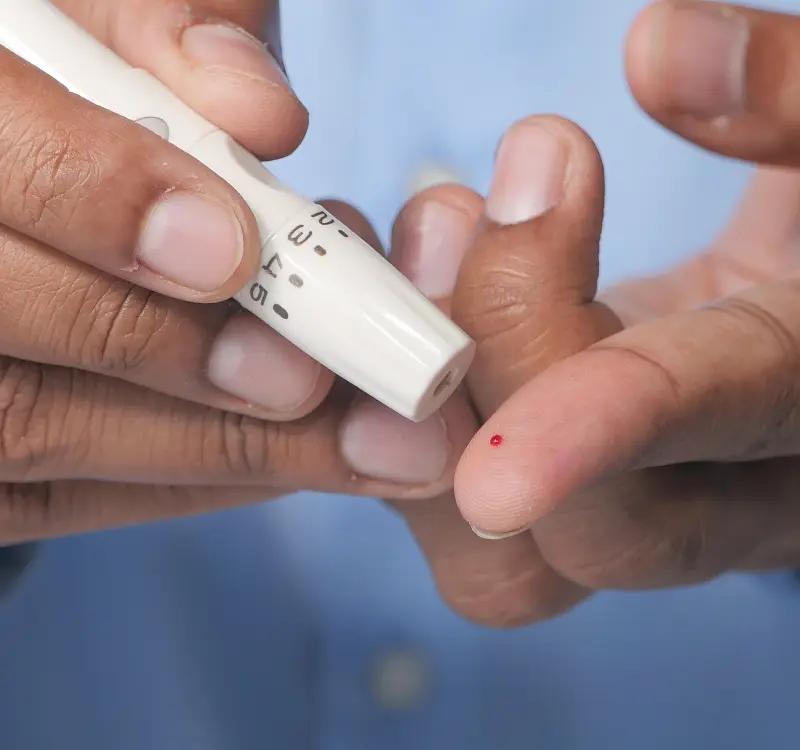Triphala for Diabetes: Benefits, Dosage, and Safety Tips
Sep 02, 2024

Managing diabetes typically involves taking medication, modifying one’s diet, and occasionally incorporating natural supplements. Among these remedies, one herb that is very helpful for diabetes is Triphala. This herbal mixture of three significant fruits has been known to possess many health benefits among people, especially those with diabetes. Diabetic patients often seek information about Triphala and its potential benefits for managing their condition.
Table of Contents:
- Triphala and Diabetes.
- Benefits of Triphala for Diabetes.
- How to Consume Triphala for Diabetes?
- Side effects of Triphala for diabetes.
- Conclusion.
- FAQs.
Triphala and Diabetes
Triphala can work well with diabetes management to help improve overall health and control blood sugar levels. Triphala, a traditional Ayurvedic remedy made from three fruits, has potential benefits for those managing diabetes. It helps regulate blood sugar and supports insulin function, crucial for effective diabetes control. Additionally, Triphala aids in weight management and enhances digestion, both of which are important for managing diabetes. Integrating Triphala into your daily routine can be a valuable natural approach to complement your diabetes care plan.
Benefits of Triphala for Diabetes
1. Regulates Blood Sugar Levels: Triphala helps in regulating blood sugar levels which is very important for the management of diabetes. It helps in improving insulin sensitivity and reducing blood glucose levels. Triphala consists of antioxidants, particularly from amalaki, which are thought to enhance the body’s ability to process glucose effectively.
2. Anti-Inflammatory Properties: The common issue in diabetes is chronic inflammation which contributes to insulin resistance and other complications. Triphala has strong anti-inflammatory properties that help to reduce inflammation in the body which results in better blood sugar control.
3. Improves Digestive Health: Tiphala helps in promoting regular bowel movements and improving gut flora. A healthy digestive system helps maintain nutrient absorption and metabolic efficiency which are beneficial for diabetes management.
4. Antioxidant Benefits: Triphala is rich in antioxidants which helps in protecting pancreatic cells from damage. It also helps in potentially improving insulin production and function. By neutralizing free radicals, Triphala supports cellular health and enhances overall metabolic function, which can be beneficial for maintaining balanced blood sugar levels.
5. Supports Weight Management: To control diabetes, it is very important to manage weight. Triphala is an effective herb to manage weight by improving metabolism rate and reducing fat accumulation. Its ability to regulate appetite and enhance digestion further supports healthy weight management, contributing to better glycemic control.
How to Consume Triphala for Diabetes?
1. Powder Form: Some of the well-known ones are Triphala powder. It is advisable to have Triphala powder once a day, at night, and with warm water only, one teaspoon is sufficient. This should assist in digestion and stabilize the blood sugar levels during the night.
2. Capsules or Tablets: In this regard, it is easier to take Triphala in capsule or tablet form since the mixture is already compressed into little capsules or tablets. It can be taken in two larger doses of 500 mg each taken throughout the day or one smaller 1,000 mg tablet, but it is recommended to follow the instructions of the manufacturer or consult a doctor.
3. Tea or Decoction: It can also be prepared in the tea form. You can learn how to prepare it by boiling 1-2 spoons of Triphala powder in water, then filtering it after 10 min. This tea made from the powder can also be taken twice to offer the same benefits as those offered by the powder.
4. With Other Herbs: Occasionally, it is compounded with other products such as methi or cinnamon in relation to impacts on blood sugar. It is always advisable to seek advice from a healthcare provider before taking any herbs to avoid harm and get the best results.
Side effects of Triphala for diabetes
1. Digestive Upset: Side effects of a high dosage of Triphala are mainly related to digestion including diarrhea, stomach pain or discomfort, and nausea. In treating children and especially when admixing the drugs, it is advisable to begin with a lower concentration and then gradually add to the concentration until the desire is achieved.
2. Interactions with Medications: Triphala can interfere with some drugs, including antidiabetic drugs. One should ensure that their Blood sugar level is checked frequently and should seek medical advice in case of any complications due to the interaction of the two.
3. Allergic Reactions: However, one should employ caution when using Triphala since in a few instances, it can cause allergic reactions. The side effects could range from rash, itching, or swelling. In case you experience severe allergies, it is advised to cease using the product and visit a doctor.
4. Impact on Absorption: Triphala may have an impact on the bioavailability of some classes of chemicals or other nutrients. One should consider taking it at a different time from when other medications or supplements are administered to avoid interferences.
Conclusion
Triphala can be a helpful addition to managing diabetes due to its antioxidant properties and ability to support weight management. It helps protect pancreatic cells, improve insulin function, and boost metabolism. However, it’s important to use Triphala wisely and consult with a healthcare provider to ensure it fits well with your overall treatment plan. Combining Triphala with a balanced diet, exercise, and prescribed medications can lead to better diabetes control and overall health.
Frequently Asked Questions
There are no strict dietary restrictions with Triphala, but maintaining a balanced diet that limits sugar and refined carbs can enhance its benefits. A healthy diet supports
The effects of Triphala for diabetes can vary, but many people start to see benefits in blood sugar control and digestion within a few weeks. Consistency is important, and results may differ based on individual health conditions.
No, Triphala should not replace prescribed diabetes medications. It is best used as a complementary treatment rather than a substitute, so continue following your healthcare provider's advice and medication regimen.
Triphala churna for diabetes is effective in managing blood sugar and improving digestion due to its antioxidant and anti-inflammatory properties.
Generally, Triphala is safe for diabetics, but consult a healthcare provider before use to avoid interactions and ensure it fits your treatment plan.
Triphala for diabetes can be taken as a powder (1 teaspoon with warm water), capsules (500 mg to 1,000 mg daily), or tea (1-2 teaspoons boiled in water).
Triphala and diabetes are linked through Triphala’s ability to manage blood sugar, enhance insulin sensitivity, and support overall metabolic health.
Yes, Triphala is beneficial for diabetes. It helps regulate blood sugar levels, improve insulin function, and protect pancreatic cells with its antioxidants.















